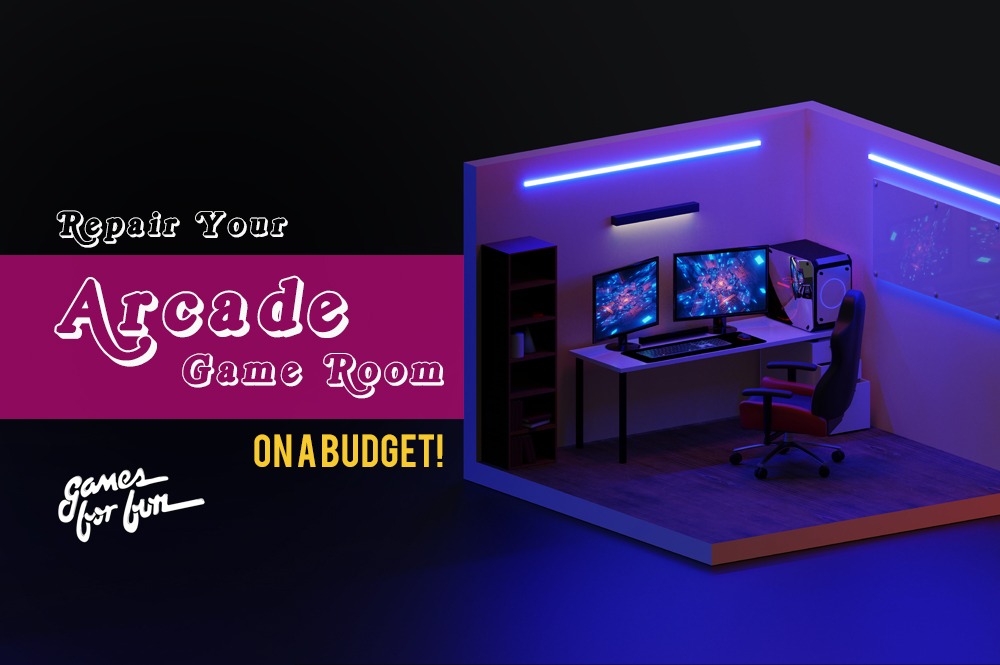Repairing an arcade game room requires several different components to execute, but a big budget isn’t what we’re going for here. But before we get into the tips, we have to preface this by saying that patience will really help you with this repair process.
If you’ve tried everything in your power to repair problem areas in your game room and something just isn’t working, it could be very tiring and frustrating. Have you ever heard of the term “ghost in the machine”? Though it has roots in philosophy, this can be applied to a very literal perspective: a repair that simply doesn’t last.
Be it a game table, a remote control, or blowing into the Diddy Kong game hoping it’ll stop freezing (whatever that means), trying to repair something in your game room could get frustrating. But remember that the purpose of your arcade room is to have fun… not to stress. And repairing your game room could help elevate that feeling of fun.
BEGINNER REMINDER:
Unplug the Unit. Don’t perform any maintenance on any arcade video games without unplugging the units first.
Now, let’s get into this list of advice to get you started on your budget-friendly arcade game room maintenance.
Clean the Console:
Cleaning the console of a unit is a great first step to improving your arcade game room without spending loads of cash. Inspect your arcade games with a thorough clean; you’d be surprised how many problems are fixable with simple cleaning.
Remember how we used to blow into the Diddy Kong game? This piece of advice is a homage to those days. Dust and dirt can get into crevices, creating unexpected gaming issues. To maintain your game, clean the parts on a regular basis.
Below are some basics you could apply that are inexpensive and effective cleaning solutions for your gaming machine:
• Buy and use a contact cleaner solution to clean connectors and other components.
• Use a paintbrush or soft bristle toothbrush to sweep away the dust and debris from boards.
• Use a vacuum to remove dust buildup from cabinet vents and fans. Make sure the fans are operating properly once you’ve cleaned off the dust and change the vents and fans as needed.
We also recommend cleaning the cabinet’s exterior by using a mild general-purpose cleaner – do not use any commercial glass cleaners unless specifically instructed by the game’s manufacturer.
It’s also important to never use paper towels to clean Plexi Glass, as this will scratch the glass. Instead, use a soft rag, such as a microfiber towel to make sure no marks or scratches will be left on the game.
You can read more maintenance tips here.
Fixing a Broken Joystick:
If you have a joystick that gets stuck all the time or is broken, or if some of the buttons aren’t working properly, consider checking the grounded wires which are usually connected to a micro switch, and examine if there’s a loop.
A knot/tangle in the wire could be part of the issue. If the part of wire is broken from the first end, it needs to be replaced. Often times, however, it’s tangled or bent and simply needs to be straightened out. You could use tweezers to fix this.
Sound/audio Issues:
The Rocker:
Some arcade machines have a rocker switch next to the power cord plugs. This switch is hidden which makes it difficult to determine if the rocker has been switched on or off. Before delving into a deep repair project, check to see if the switch is in an off or on position.
Sometimes, we need to get into the machine to diagnose the problem of missing sound and audio. If you’re willing to go to the arcade machine, check to see that the “door switch” (the switch that joins and cuts the power to the machine) is in the closed door position.
No Light in Top Marquee:
Most machines, especially the old ones, can come with a fluorescent backlight built into the marquee. This is one of the most iconic parts of an arcade machine. However, though this addition can help to illuminate the screen, or give it a nice psychedelic style, fluorescent lamps have been obsolete for quite some time as arcade cabinet components for a variety of reasons.
For one: these lamps require a starter and a transformer in order to function properly, and the failure of any of these elements can cause several consequences of varying magnitude.
• If the starter is malfunctioning, the ensuing electrical interference can disrupt of even permanently damage the machine’s PCB.
• If the transformer is failing, it might overheat, smoke, and eventually burst a big hole in your cabinet.
• The lamp itself is also very hot during operation, which can discolor the marquee, crack it, and fall into the screen of the arcade cabinet. A good solution to this predicament is to switch the fluorescent lamp for an LED alternative, which can operate at much cooler temperatures, and will not damage your machine in any way.
Check out PrimeTime Amusements article on maintaining your game room here.
In Summary:
So here we are: we hope we’ve repaired your arcade game room virtually, and your machines are doing what they are best at – playing games. To read more about awesome techniques and tips, click here.
And as one final rule of thumb that we simply can’t stress enough: Don’t fear the manual.
When dealing directly with an arcade gaming unit, your best bet is to pay attention to the game manual. Not many of us enjoy reading instruction manuals, but it’s helpful when your game room seems to be breaking down on you.
Troubleshooting an arcade game machine could seem way less daunting if you have the instructions telling you all the technical parts and how everything fits.
In fact, Pinball repair technician Sarah St. John, 43, got her start in pinball repair as a 16-year-old Pittsfield High School student in 1981 working as a summer technician. My Arcade Repair features this story on their website.







